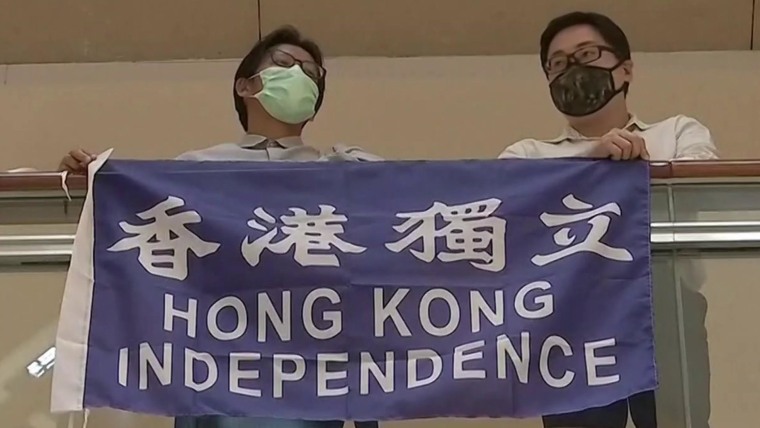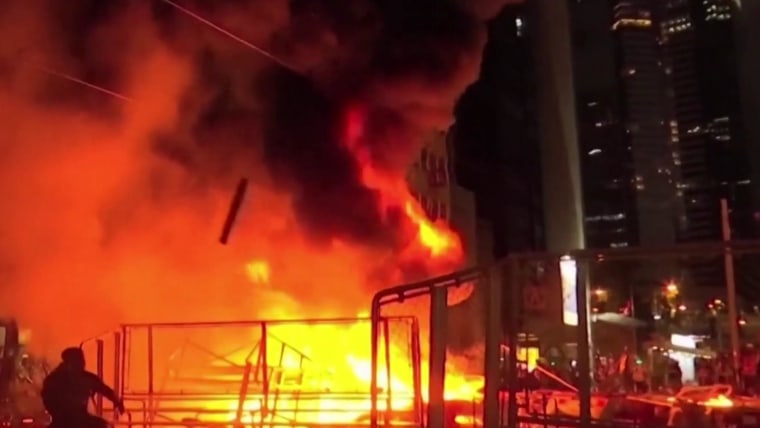HONG KONG — Thousands of people holding candles gathered Thursday in Hong Kong for a somber memorial to mark the 31st anniversary of China’s military crackdown on demonstrators at Tiananmen square — despite an official ban on gatherings due to the coronavirus.
Thursday marks 31 years since Chinese troops opened fire on June 4, 1989, to end student-led unrest around the square in Beijing. Rights groups say the enforcement action may have killed thousands of protesters, although the official government count was a few hundred.
Hong Kong also passed a law Thursday that criminalizes the insulting of China’s national anthem, amid chaotic scenes in the territory’s legislature.
The law, passed after three readings, makes it illegal to insult the “March of the Volunteers” anthem. Booing, changing the lyrics or disrespecting the song is now punishable with up to three years in prison or fines equal to about $6,450.
Following the passage last month of a security law by Beijing at its National People’s Congress, pro-democracy lawmakers fear the anthem bill represents further encroachment by the mainland on the semi-autonomous territory.
Scuffles broke out several times in Hong Kong’s legislature during the passage of the anthem bill. On Thursday police entered the chamber after two pro-democracy lawmakers threw around foul-smelling liquid — they said to protest China’s crackdown at Tiananmen Square.
The topic is taboo on the mainland and Chinese authorities ban public commemorations.
Chinese state media have drawn parallels between the event and President Donald Trump’s recent vow to use military force to quell violence that erupted in the U.S. following the police killing in Minneapolis of a black man named George Floyd.
Let our news meet your inbox. The news and stories that matters, delivered weekday mornings.
“The U.S. is proving the importance for China to restore order in 1989. But back then, the destruction of China’s order was much worse than U.S. now,” wrote Hu Xijin, editor of the Global Times, a state-run Chinese tabloid, on Twitter.
Tensions between China and the U.S. have been rising amid the global coronavirus pandemic, with a war of words that some have dubbed a new Cold War.
Chinese media have paid close attention to the recent U.S. protests, contrasting them with support from U.S. politicians for pro-democracy demonstrations that were frequent in Hong Kong last year.
Further Hong Kong protests flared up last month after Beijing side-stepped the territory’s own legislature to pass a security law that critics warn could erode human rights protections and the territory’s unique status.
The law was condemned by the U.S. and other countries, and President Trump said it would likely spell the end of the special economic treatment that Hong Kong enjoys under U.S. law.
On Wednesday, State Department spokeswoman Morgan Ortagus said the U.S. honored the “brave Chinese people whose peaceful calls for democracy, human rights, and a corruption-free society came to a violent end,” at Tiananmen in 1989.
“We stand with the people of China who continue to aspire to a government that protects human rights, fundamental freedoms, and basic human dignity,” she said in a statement.
On the eve of the Tiananmen anniversary, democratically ruled Taiwan called on China to apologize for the bloody 1989 crackdown and begin democratic political reform. The call was dismissed as “nonsense” by China’s foreign ministry.
“As to the political disturbance in the late 1980s, China has drawn a clear conclusion,” Chinese Foreign Ministry spokesman Zhao Lijian, said at a press briefing Wednesday.
In Hong Kong, too, where public commemorations normally go ahead each year, for the first time, vigils will take place online — due to the coronavirus pandemic, officials say — although more than one thousand people still gathered at the city’s central Victoria Park.
The Hong Kong Alliance, a pro-democracy advocacy group formed in 1989, has organized a virtual candlelight vigil. The group said it would also stream a program of events online, including a minute’s silence and slogan chanting.
“We believe the people of Hong Kong should have the right to light up a candle to condemn the massacre; this is part of our freedom of speech,” Lee Cheuk-yan, chairman of the Hong Kong Alliance, told NBC News.
“With the national security law we will still continue to have the vigil. … There may be personal risk but we do not want to live in fear. We will still continue.”
Hong Kong’s Chief Executive Carrie Lam, speaking Wednesday from Beijing, said the territory would not back down on national security laws and that foreign governments were displaying “double-standards.”
Justin Solomon, Tesa Arcilla and Ed Flanagan reported from Hong Kong. Adela Suliman reported from London.
Reuters contributed to this report.














